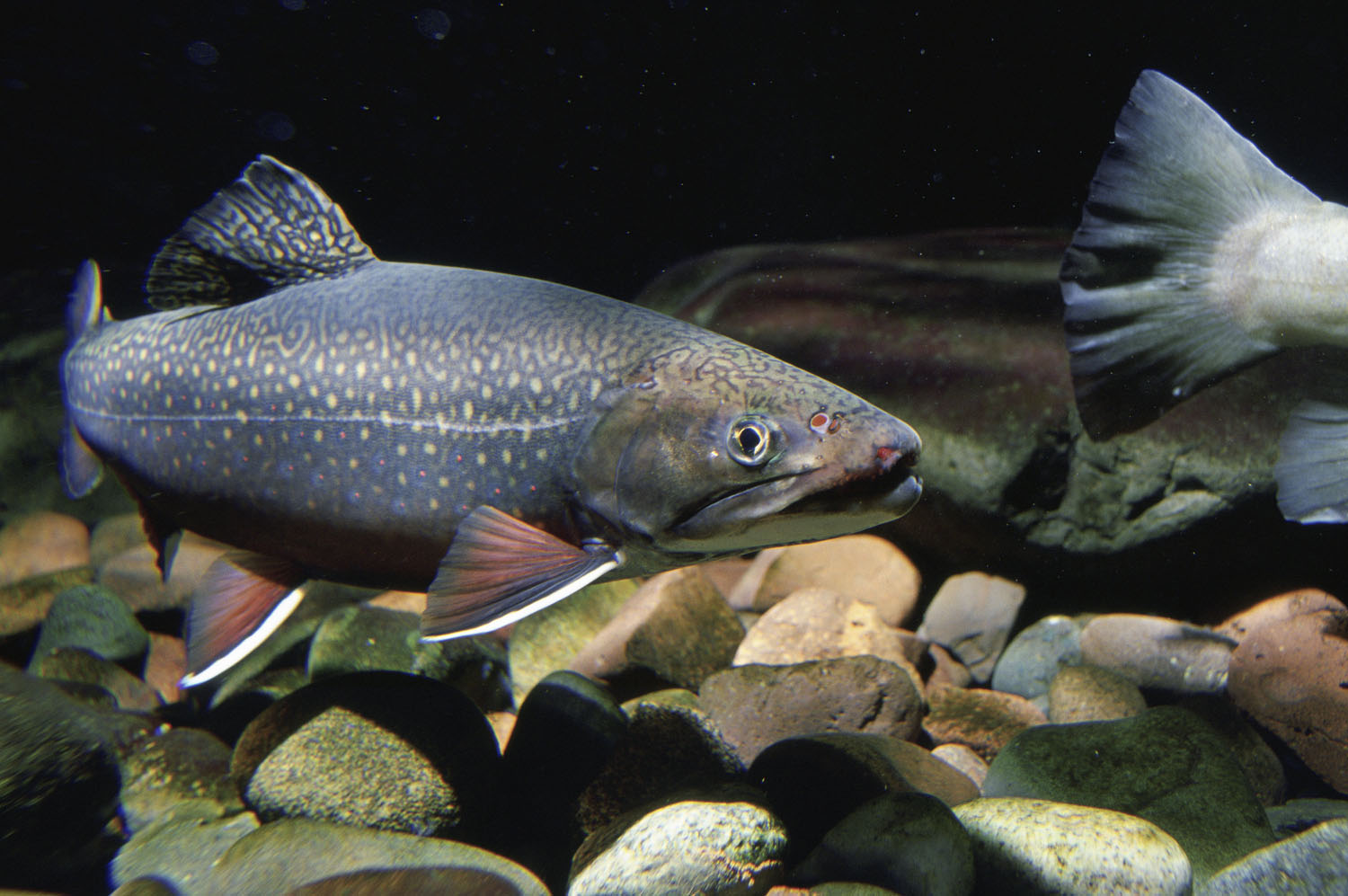EarthTalk®
From the Editors of E/The Environmental Magazine 
Dear EarthTalk: A fisherman friend of mine told me that trout populations in the Interior West of the U.S. are already shrinking due to global warming. Is this true? And what is the long term prognosis for the trout? -- Jon Klein, Portsmouth, NH Most scientists agree that the effects of global warming are starting to show up all around the world in many forms. Throughout America’s Rocky Mountain West, rivers and streams are getting hotter and drier, presenting new challenges for trout already struggling with habitat fragmentation and pollution. A recent report by the Natural Resources Defense Council (NRDC) and Montana Trout Unlimited (MTU) found that global warming is shrinking cold-water fish habitat, threatening the trout and other fish that depend upon it. Scientists believe that the nearly five degree (F) temperature increase forecasted for the Interior West could reduce trout habitat by half in this century, sending trout populations into a tailspin. While declines in trout population are bad for local ecosystems and biodiversity, they are also bad for people—especially sport fishers and those employed by the billion dollar recreation industry. In Colorado, sport fishing contributes $800 million to the state’s economy each year and supports 11,000 jobs. In Montana, angling generates $300 million annually. Trout fishing also brings in big dollars to New Mexico, Utah, Wyoming and Idaho. “Hotter temperatures are shutting down our most popular streams during the height of the fishing season,” says MTU’s Bruce Farling. “The closures are becoming an annual event when trout are stressed by warm water and low flows. The implications…are clear: fewer trout and fewer opportunities to fish.” A U.S. Forest Service (USFS) study found that between 53 and 97 percent of natural trout populations in the Southern Appalachian region of the U.S. could disappear due to warmer temperatures predicted by global climate change models. The three species of trout in question—Brooks, Rainbows and Browns—are already barely hanging on due to road building, channelization and other man-made disturbances. “As remaining habitat for trout becomes more fragmented, only small refuges in headwater streams at the highest levels will remain,” says biologist Patricia Flebbe of USFS’s Virginia-based Southern Research Station. “Small populations in isolated patches can be easily lost and, in a warmer climate, could simply die out,” she warns, adding that Southern Appalachia trout fishing may become “heavily managed.” “Trout are one of the best indicators of healthy river ecosystems; they’re the aquatic version of the canary in the coalmine,” says NRDC’s Theo Spencer. “This is our wake up call that urgent action is needed today to reduce heat-trapping pollution that causes global warming.” NRDC is calling for swift enactment of climate change legislation and for limiting logging and road building near trout streams to ensure enough shade to maintain cooler water temperatures. Also, they say, placing fallen trees and branches and boulders into rivers and streams will help provide shelter for fish and create deeper pools that collect cooler water. Keeping pesticides and fertilizers out of watersheds will also improve the quality of habitat and likelihood of survival for trout species facing an uncertain future. CONTACTS: NRDC, www.nrdc.org; MTU, www.montanatu.org; USFS, www.srs.fs.usda.gov.
Wild Veggie™, the Souper Drink™, is an all-natural vegan soup or drink that can be enjoyed hot or cold, and is rich in flavor and nutrition. Starting with farm-fresh crops picked in season, Wild Veggie is gently processed with minimal ingredients to assure real vegetable taste and healthy benefits. There are no artificial ingredients in Wild Veggie — just fresh vegetables, lightly seasoned. You can serve versatile Wild Veggie as a chilled soup or healthy, nutritious drink. Or, heat Wild Veggie for a warm flavor-filled soup. You can even add Wild Veggie into recipes for rich vegetable flavor. Visit: www.wildveggie.com. 
THE SKINNY ON SWEET We all love a little something sweet now and then. Imagining a life without dessert seems like a life without the sweet icing. Just because a person leads a diabetes life, it doesn't mean that the sweet stuff goes down the drain. Blood sugar levels are a delicate matter. Should I go for the sugar-free stuff? Or do I have sugar instead? Let's take a look at the pros and cons regarding sugar-free vs. sugar.
So, you're meeting a good friend at a coffee shop for a hot drink. In the case is a selection of muffins. Some are sugar-free, some are not. Sugar-free is a term cluing you in to the use of a sugar substitute in place of the real thing. The synthetic ones are the artificial sweeteners. Natural or synthetic sweeteners contain less than 0.5 grams of sugar per serving and used to provide the taste of sugar with fewer calories. Although the package proudly advertises itself as being sugar-free, turn it over and check out your calorie content. Even sugar-free gum may have a calorie count. So read that label and take a look at what you are getting. Sugar-free doesn't always mean calorie-free or carbohydrate-free. As you may already know, carbohydrates break down into glucose that can have an impact on your blood sugar levels. In general, these sugar substitutes are safe to eat. A variety of them are available for market consumption, such as sucralose, aspartame, stevia, and sorbitol. It is common to experience a bitter after taste, which you may find unpleasant. Acesulfame-K is one of these. Sucralose is made from sugar. 600 times sweeter than table sugar, sucralose contains no calories and is heat stable, so you can conveniently bake with it. Stevia is a natural sweetener. The stevia rebaudiana plant is one of a genus of 240 stevia plants and is native to South and Central America. Its extracts are 300 times sweeter than sugar, no calories and have a negligible affect on blood sugar. This plant extract has been widely studied in Japan, where it was first used as a commercial sweetener in 1971. Considered safe by most health experts and in December 2008 it got the USFDA's stamp of approval. It does have a slight after taste. But the results on stevia appear promising.
You may have heard negative sound-offs on aspartame. Press links it to a list of problems such as poor insulin control, cancer, birth defects and more. Please consult this matter better with your physician. There are many other alternatives to this particular sugar substitute that you can try.
The problem with many sugar-free desserts is that sometimes they contain more fat, and therefore more calories, in order to compensate for the hollow taste of sugar substitutes. It's important to always read labels so you know exactly what you're putting in your mouth. Even sugar, in moderation, is fine for most people living with diabetes. The real stuff tastes better and is more satisfying but using portion control is vital. And, take into consideration the amount of carbohydrates you are consuming. So, should you be all the way sugar-free? In the end, that is for you to decide on your own. Along with your doctor's watchful care, a solid nutrition program and regular exercise, you can lead a wonderful life while you manage your diabetes. Remember to turn that package over and consider all aspects of the nutritional information you see. Sugar-free doesn't equal carb or calorie-free. Keep those lines of communication open. Keep educating yourself. The more information you can gather the better position you will be in to take better care of yourself. Stay strong. Be well. By: Vera Louise Pagan v
|





